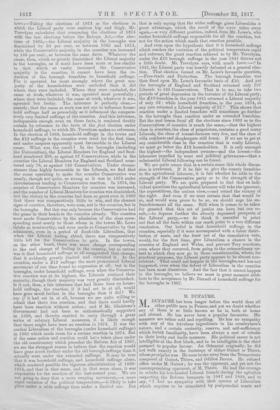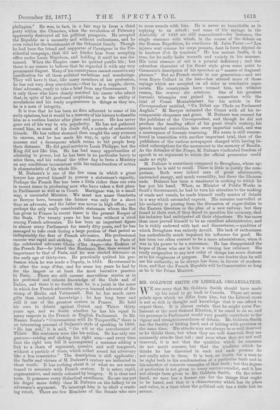M. DUFAURE.
DUFAURE has been longer before the world than all 1.11 • other public men in France, and yet we doubt whether any of them is so little known as he is, both at home and abroad. He has never been a popular favourite. His manners are rather cold and repelling. He has no sympathy with any of the frivolous ingredients in his countrymen's nature, and a certain austerity, reserve, and self-sufficiency which forbid familiarity, have been always a sort of rebuke to their levity and facile manners. His political career is not intelligible at the first blush, and to be intelligible is the chief passport to popular favour. An Orleanist originally, he did not walk exactly in the footsteps of either Guizot or There, whose prete'gelte was. He soon broke away from the Triumvirate composed of Guizot, Thiers, and Odillon Barret. He refused office under M. Guizot; he was the opponent, and yet not the uncompromising opponent, of M. Thiers, He had the courage to rebuke his hot-headed Liberal friends during the agitation respecting the Reform banquets in 1847 and 1848, and to say, "I feel no sympathy with that species of Liberalism which requires to be stimulated by postprandial toasts and philippics." He was, in fact, in a fair way to form a third party within the Chamber, when the revolution of February apparently destroyed all his political prospects. He accepted the Republic as a necessity and without enthusiasm, and he even voted for the banishment of the Orleanist family. Though he had been the friend and supporter of Cavaignac in the Pre- sidential campaign, that did not hinder him from accepting office under Louis Napoleon, and holding it until he was dis- missed. When the Empire came he quitted public life ; but there is no reason to believe that he regarded it with any very permanent disgust. Many of his countrymen cannot conceive any justification for all these political variations and wanderings. They will have it that, like many members of his profession, he has not very deep convictions,—that he is a supple, clever, blasé advocate, ready to take a brief from any Government. It is only those who have closely watched his career who admit that, in spite of his profound scepticism as to the utility of revolutions and his ready acquiescence. in things as they are, he is a man of integrity. It is true that he has been no firm adherent to some of his early opinions, but it would be a travesty of his history to describe him as a restless hunter after place and power. He has never gone out of his way to win popularity. He has not gathered round him, as some of his rivals did, a coterie of subservient friends. He has rather shunned than sought the easy avenues to success, and he has made his way, in spite of faults of manner and a demeanour which seems to bid people keep their distance.' He did good service to Louis Philippe, but the King did not like him. He has had many opportunities of attaining to power, but he has been in no particular hurry to seize them, and his refusal the other day to form a Ministry on any conditions inconsistent with his entire freedom of action is characteristic of his whole life.
M. Dufaure's is one of the few cases in which a great lawyer has proved himself to possess a statesman's capacity. Perhaps the French Bar has been a little richer than our own in recent times in producing men who have taken a first place in Parliament as well as in Court. Martignac was, in a small way, a successful Minister. We must not name Gambetta or Berryer here, because the former was only for a short time an advocate, and the latter was never in high office ; and perhaps the only really considerable statesman whom the Bar has given to France in recent times is the present Keeper of the Seals. For twenty years he has been without a rival among French advocates. He has been an important figure in almost every Parliament for nearly fifty years, and he has managed to take rank during a large portion of that period as indisputably the first of French advocates. His professional success was rapid and striking. A fellow-student in Paris of the celebrated advocate Chaix d'Est Ange—the Erskine of the French Bar—he joined the Bordeaux Bar, then second in importance to that of Paris, and he was elected bdtonnier at the early age of thirty-two. He practically quitted his pro- fession when he was made a Deputy, in 1834. He returned to it after the coup defeat, and for some ten years he had by far the largest or at least the most lucrative practice in Paris. There are still current marvellous stories as to his profound and minute knowledge of the Code and of Dalloz, and there is no doubt that he is a jurist in the sense in which few French advocates are,—a learned advocate of the stamp of Merlin and Vatimesnil. But he has much rarer gifts than technical knowledge ; he has long been and still is one of the greatest orators in France. He held his own in debate against Guizot and Thiers thirty years ago, and we doubt whether he has his equal in many respects in the French or English Parliament. In Mr. Nassau Senior's "Conversations with De Tocqueville," there is an interesting account of Dufaure's style of speaking in 1848. "He has not," it is said, "the wit or the entrainment of Tillers. His sentences were like his action. He has only one gesture—raising and sinking his right arm—and every time that the right arm fell it accompanied a sentence adding a link to a chain of argument, massive and well tempered, without a particle of dross, which coded round his adversary like a boa constrictor." The description is still applicable; the faults and virtues of M. Dufaure's oratory are indicated in these words. It has nothing about it of what we are accus- tomed to associate with French oratory. It is sober, rapid, augmentative, and rarely coloured by imagery. It is clear and terse. It possesses every dialectical excellence. No one can put his finger more deftly than M. Dufaure on the fallacy in an adversary's argument. To interrupt him is to elicit a crush- ing retort. There are few Members of the Senate who care to cross swords with him. He is never so formidable as in replying to an attack ; and some of his sayings in the Assembly of 1848 are still remembered—for instance, the single sentence with which, in the course of the debate on the Roman Expedition, he overthrew M. Jules Favre :—" Les injures sent comme les corps pesants, dont la force d6pend de la hauteur d'oh us tombent." He has serious faults, it is true, for he sadly lacks warmth and variety in his manner. His total absence of wit is a painful deficiency ; and the colourless character of his fluent style gives some point to Cormenin's description of his speeches as "masses of stagnant phrases." But no French orator in our generation—and not even Royer Collard in the last—has uttered more of those sayings which are accepted on all sides as conclusive argu- ments. His countrymen have termed him, not without reason, the orateur des solutions. One of his greatest forensic triumphs was gained in connection with the trial of Count Montalembert for his article in the Correspondctnt entitled, "Un Debat sur l'Inde au Parlement Anglais." M. Berryer defended the Count with all his in- comparable eloquence and grace. M. Dufaure was counsel for the publisher of the Correspondant, and though he did not produce the dazzling effect of his great rival's oratory, his speech carried conviction into every impartial mind, and was a masterpiece of forensic reasoning. His name is still remem- bered in conneCtion with another important trial, that of the publishers of the various newspapers charged with having in- vited subscriptions for the monument to the memory of Baudin. As the defender of the Temps, M. Dufaure vindicated freedom of speech in an argument to which the official prosecutor could make no reply. M. Dufaure is sometimes compared to Brougham, whose ap- pearance he is said to recall. There is little to justify the com- parison. Both were indeed men of great attainments, unwearied energy, and much versatility, but there the likeness ends. Dufaure has been a smatterer in nothing to which be has put his hand. When, as Minister of Public Works in Soult's Government, he had to turn his attention to the making of roads and canals, he made himself really master of details in a way which astounded experts. His enemies marvelled at his audacity in passing from the discussion of sugar-duties to the Eastern Question or the plan of a new railway, but they found to their cost, if they dared to question his accuracy, that his industry had anticipated all their objections. He has more than once proved himself to be an excellent administrator, and he is richly endowed with tact and discreetness,—qualities of which Brougham was entirely devoid. His lack of enthusiasm has undoubtedly much impaired his influence for good. He has been too often content to be a mere administrator, when it was in his power to be a statesman. He has disappointed the hopes of those who saw in him a coming law reformer. His ready resignation to any now order of things has sown distrust as to his singleness of purpose. But no one doubts that he will use his authority, as he always has done, in favour of modera- tion, and that the French Republic will be Conservative so long as he is the Prime Minister.







































 Previous page
Previous page